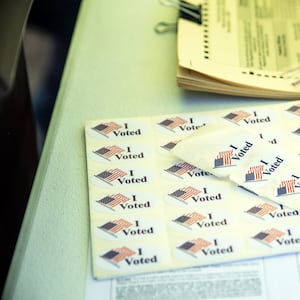U.S. District Judge Amy Totenberg has boxed herself into a dilemma.
She has kept a report on a theoretical voting machine flaw—authored by a respected computer researcher—secret since last summer, citing concerns that releasing the report would fuel conspiracy theories about voting machines and the 2020 U.S. presidential election.
But her attempts at preventing conspiracy theories has fueled those theories anyway. And now, she has Georgia's top elections official, Brad Raffensberger, urging her to make the report public.
For now, Totenberg decided Thursday that she would keep the document private. But she said she would review the report herself and potentially make a new judgment soon—possibly as soon as Monday.
“I’m unhappy about the course of political treatment of the report… it’s out of hand,” a clearly frustrated Totenberg said in court Thursday. “But I’m not going to release it without seeing what is being proposed with redactions.”
The judge’s decision to keep the report private last year has generated plenty of scrutiny—and interest from the Department of Homeland Security, Louisiana’s secretary of state, and Fox News.
Many want to see what, exactly, Michigan computer science professor J. Alex Halderman found that led him to conclude that a non-technical person could spend a few minutes in a voting booth and change how a particular machine tallies votes.
“Georgia voters face an extreme risk that [ballot marking device]-based attacks could manipulate their individual votes and alter election outcomes,” Halderman said of the secret report in a signed declaration last year, as The Daily Beast previously reported.
And facing mounting pressure—including from fellow Republican allies like Gov. Brian Kemp—Secretary of State Brad Raffensperger issued a statement Thursday urging transparency.
Although Halderman has already asked for a safer, redacted version of his report to be made public, Raffensperger issued a statement Thursday “calling on J. Alex Halderman” to ask the judge to publicly release his findings. “The public deserves to know the context of J. Alex Halderman’s claims,” Raffensberger said.
In court, the state agency’s lawyer, Vincent Robert Russo Jr., said not making the report public would do more harm than good. “It’s unfortunate that we’re in this position,” Russo said.
Raffensberger’s pivot may represent less of a genuine interest in exploring the revelations in Halderman’s report, and more of an attempt to call out Halderman’s bluff. Raffensberger noted Thursday he thought the report was not an “objective, academic study.”
Although some will welcome Raffensperger’s sudden call for transparency, it does come with some political risk. The Republican secretary of state came under attack from former President Donald Trump for asserting that the 2020 election was fair and accurate—and has drawn several GOP challengers for his reelection campaign this year.
If the report is made public and the flaws are proven to be real, his office will have only a few months to fix them before the primary elections in May—or face even more fear mongering about hacked voting machines from conspiracy theorists.
Totenberg has for months insisted that the 25,000-word report remain “attorney’s eyes only” and had resisted Halderman’s own request to make public a redacted version of the report to allow the voting machine manufacturer to fix any flaws.
Halderman has wanted to release a redacted version of the report that would not serve as a blueprint for would-be hackers, but Thursday was the first time Raffensperger supported that move.
The document’s release wouldn’t just be relevant for the ongoing court case and Raffensberger; the machines in question that may have the theoretical vulnerability are also in use in various jurisdictions in multiple states around the country, some of which have expressed interest in receiving more information about the alleged flaws. Some of the states are holding elections this year.
Fox News is also watching the case with keen interest. They’ve been working to fend off a defamation suit from the machine maker in question, Dominion Voting Systems, that the news station had been spreading conspiracy theories about how the vendor’s technology may have contributed to election meddling.
Although its attorneys had access, Dominion itself had been blocked from viewing the report for months, but two sources familiar with the court case told The Daily Beast that the company obtained Halderman’s findings in December. The company did not immediately confirm that on Thursday afternoon.
In a statement issued alongside the Georgia secretary of state, Dominion CEO John Poulus attacked Halderman’s review. “Dominion supports all efforts to bring real facts and evidence forward to defend the integrity of our machines and the credibility of Georgia’s elections,” he said.
In court on Thursday, David Cross, an attorney for the voting rights activists who commissioned the report and are seeking to replace the state’s voting machines, said that there’s now another reason to make this report public.
“As long as this report stays sealed… it’s hurting Dr. Halderman’s professional integrity,” he said.
For some, the entire conversation about potential vulnerabilities in voting machines, including in this case, has always led them back to one conclusion: That using paper ballots, while leaving some machines available for those with disabilities, would be the most secure way to run elections.
Election security experts have long argued that paper ballots would eliminate any concerns about hackers interfering in elections’ operations.










